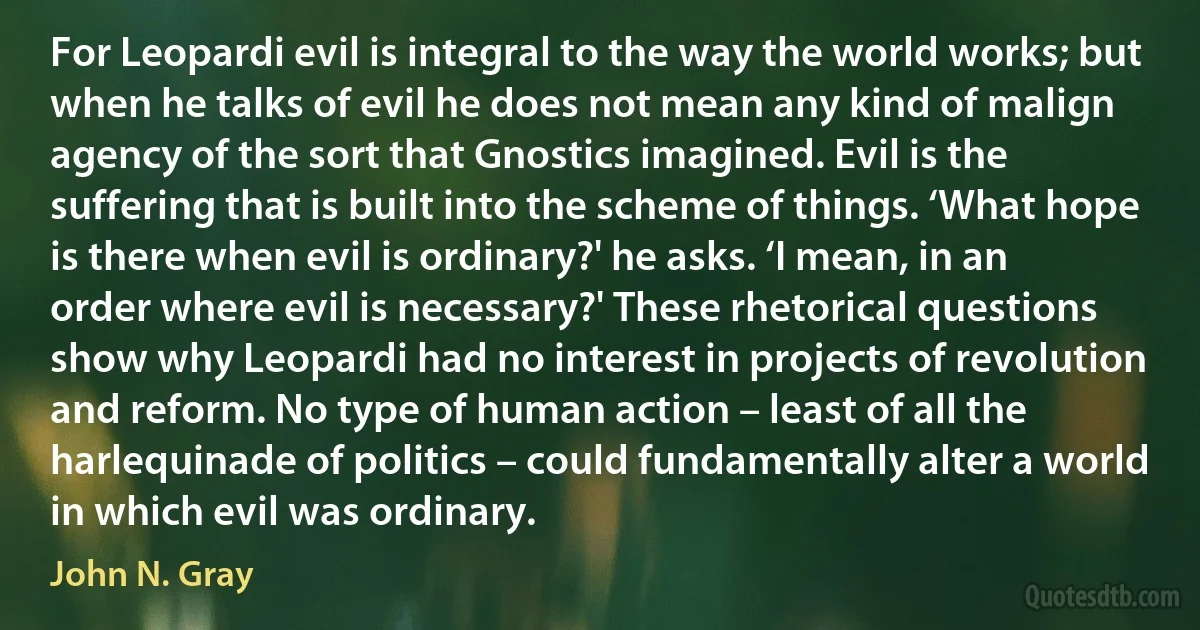
For Leopardi evil is integral to the way the world works; but when he talks of evil he does not mean any kind of malign agency of the sort that Gnostics imagined. Evil is the suffering that is built into the scheme of things. ‘What hope is there when evil is ordinary?' he asks. ‘I mean, in an order where evil is necessary?' These rhetorical questions show why Leopardi had no interest in projects of revolution and reform. No type of human action – least of all the harlequinade of politics – could fundamentally alter a world in which evil was ordinary.
John N. GrayRelated topics
action built evil hope human integral interest kind least mean necessary order politics revolution rhetorical show sort suffering way world works things projects questionsRelated quotes
The nude gains its enduring value from the fact that it reconciles several contrary states. It takes the most sensual and immediately interesting object, the human body, and puts it out of reach of time and desire; it takes the most purely rational concept of which mankind is capable, mathematical order, and makes it a delight to the senses; and it takes the vague fears of the unknown and sweetens them by showing that the gods are like men and may be worshiped for their life-giving beauty rather than their death-dealing powers.

Kenneth Clark
If every day a man takes orders in silence from an incompetent superior, if every day he solemnly performs ritual acts which he privately finds ridiculous, if he unhesitatingly gives answers to questionnaires which are contrary to his real opinions and is prepared to deny his own self in public, if he sees no difficulty in feigning sympathy or even affection where, in fact, he feels only indifference or aversion, it still does not mean that he has entirely lost the use of one of the basic human senses, namely, the sense of humiliation.

Václav Havel
To eliminate the discrepancy between men's plans and the results achieved, a new approach is necessary. Morphological thinking suggests that this new approach cannot be realized through increased teaching of specialized knowledge. This morphological analysis suggests that the essential fact has been overlooked that every human is potentially a genius. Education and dissemination of knowledge must assume a form which allows each student to absorb whatever develops his own genius, lest he become frustrated. The same outlook applies to the genius of the peoples as a whole.

Fritz Zwicky
Here's to the crazy ones. The misfits. The rebels. The troublemakers. The round pegs in the square holes. The ones who see things differently. They're not fond of rules. And they have no respect for the status quo. You can quote them, disagree with them, glorify or vilify them. About the only thing you can't do is ignore them. Because they change things. They push the human race forward. And while some may see them as the crazy ones, we see genius. Because the people who are crazy enough to think they can change the world, are the ones who do.

Steve Jobs
Males do not represent two discrete populations, heterosexual and homosexual. The world is not to be divided into sheep and goats. Not all things are black nor all things white. It is a fundamental of taxonomy that nature rarely deals with discrete categories. Only the human mind invents categories and tries to force facts into separated pigeon-holes. The living world is a continuum in each and every one of its aspects. The sooner we learn this concerning human sexual behavior, the sooner we shall reach a sound understanding of the realities of sex.

Alfred Kinsey
